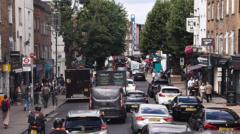Could the Israeli Strike Near Al-Shifa Hospital Be the Deadliest for Journalists in Gaza?

Understanding the Impact of Conflict on Journalists: The Tragic Death of Four Al Jazeera Reporters in Gaza
The recent death of four Al Jazeera journalists in an Israeli strike near Gaza City's Al-Shifa Hospital underscores the perilous conditions under which journalists operate in conflict zones. This incident has raised significant concerns about press freedom, the safety of media personnel, and the broader implications of military operations in civilian areas. As the situation in Gaza escalates, understanding the risks faced by journalists becomes increasingly important for both reporting and humanitarian perspectives.
The Incident: A Snapshot of Tragedy
On a fateful day, correspondents Anas al-Sharif and Mohammed Qreiqeh, along with cameramen Ibrahim Zaher and Mohammed Noufal, were positioned in a tent for journalists at the main gate of Al-Shifa Hospital when the strike occurred. Al Jazeera reported that this targeted attack has led to widespread condemnation and raised alarm bells regarding the ongoing violence against media personnel.
Just weeks prior to the strike, Al Jazeera had publicly criticized the Israel Defense Forces (IDF) for what it termed a "campaign of incitement" against its reporters in Gaza. This prior context makes the tragic deaths of these journalists not just a mere incident of collateral damage but part of a larger narrative surrounding the treatment of journalists in conflict zones.
Al Jazeera's Response and the IDF's Justification
Following the attack, the IDF confirmed on Telegram that Anas al-Sharif was targeted because he was allegedly the head of a terrorist cell affiliated with Hamas. This controversial assertion raises questions about the IDF's policies and the criteria used for targeting individuals in conflict. Notably, the IDF did not mention the other journalists killed in the strike, which adds another layer of complexity to their justification.
Moreover, Al Jazeera has vehemently condemned these allegations, insisting that their journalists were simply doing their job. The network issued a strong statement denouncing the IDF's actions and the ongoing threats faced by its journalists, emphasizing the dangers of targeting media personnel. This situation highlights the critical need for protections for journalists working in conflict zones.
The Broader Implications of Violence Against Journalists
The deaths of Anas al-Sharif, Mohammed Qreiqeh, Ibrahim Zaher, and Mohammed Noufal are part of a disturbing trend in which journalists are increasingly targeted in conflict situations. According to the Committee to Protect Journalists, at least 186 journalists have been confirmed killed since the onset of Israel's military offensive in Gaza in October 2023. This statistic not only underscores the dangers of war reporting but also raises questions about the accountability of military forces in conflict zones.
Journalists play a crucial role in informing the public about events unfolding in conflict areas. Their ability to report accurately and without fear of retribution is essential for a functioning democracy. However, as the risks increase, so does the necessity for international organizations and governments to advocate for the safety and security of journalists worldwide.
Challenges Faced by Journalists in Conflict Zones
Working in conflict zones presents myriad challenges for journalists, including:
- Physical Safety: Journalists often find themselves in the crossfire of military engagements, making their physical safety a paramount concern.
- Access to Information: In many cases, journalists face restrictions that limit their ability to collect information and report accurately on events.
- Psychological Impact: Witnessing violence and suffering can lead to significant mental health challenges, including PTSD.
- Legal Risks: Journalists may face legal repercussions from governments seeking to suppress dissenting voices.
The Importance of Press Freedom
Press freedom is a fundamental right that enables journalists to perform their duties without fear of censorship or violence. It is essential for ensuring an informed public and holding those in power accountable. The tragic deaths of Al Jazeera's journalists serve as a reminder of the necessity to protect media freedoms globally.
Organizations such as the Committee to Protect Journalists and Reporters Without Borders play a vital role in advocating for journalists’ rights and safety. Their work highlights the need for systemic changes to ensure that journalists are viewed as protectors of truth rather than threats to security.
Global Reactions and the Call for Accountability
The killing of journalists in conflict zones often sparks outrage and calls for accountability. International bodies, human rights organizations, and governments must come together to condemn such actions and push for investigations into the circumstances surrounding these deaths. Ensuring accountability is crucial to deterring future violence against journalists and protecting press freedoms.
In the case of the Al Jazeera journalists, the international community's response will be closely scrutinized. Calls for thorough investigations and accountability are essential not just for the families of the deceased but also for the integrity of journalism in high-risk areas.
Conclusion: Reflecting on the Value of Journalism in Conflict
The tragic loss of four Al Jazeera journalists is a stark reminder of the dangers faced by reporters in conflict zones. Their commitment to delivering news from Gaza highlights the essential role that journalists play in informing the global community about the realities of war. As we reflect on their sacrifice, it is crucial to advocate for the protection of journalists worldwide, ensuring that they can report freely and safely.
In a world rife with conflict and misinformation, the importance of a free press cannot be overstated. As we follow ongoing developments in Gaza and other conflict zones, let us remember the names of those who lost their lives in pursuit of truth and justice. What measures do you believe should be taken to better protect journalists operating in conflict zones? #PressFreedom #JournalismMatters #ProtectJournalists
FAQs
What happened to the Al Jazeera journalists in Gaza?
Four Al Jazeera journalists were killed in an Israeli strike near Al-Shifa Hospital in Gaza City while reporting on the ongoing conflict.
What has been the response from Al Jazeera regarding the incident?
Al Jazeera condemned the IDF's actions and criticized the ongoing campaign against its journalists in Gaza, emphasizing the need for protections for media personnel.
How many journalists have been killed in Gaza since the conflict escalated in October 2023?
According to the Committee to Protect Journalists, at least 186 journalists have been confirmed killed since the escalation of the conflict in October 2023.
Why is press freedom important in conflict zones?
Press freedom is vital for ensuring an informed public, holding power to account, and providing accurate reporting on the realities of conflicts, which can influence international response and humanitarian efforts.
What actions can be taken to protect journalists in conflict areas?
Advocacy for legal protections, international oversight, and support from media organizations can enhance the safety of journalists in conflict zones.
Published: 2025-08-10 22:49:09 | Category: technology



